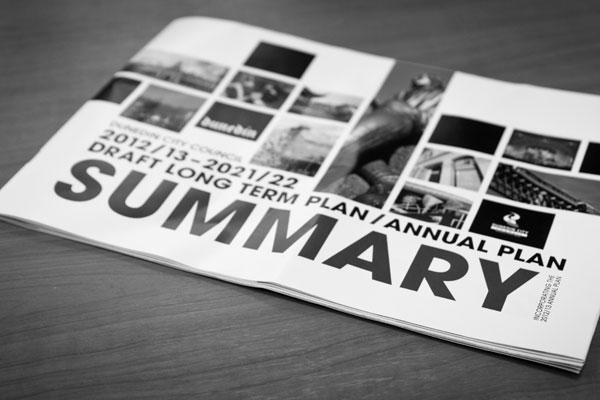DCC Plans Dunedin’s Future
Godzilla Insurance Expensive, Debt Soars
Council debt from community projects such as the Forsyth Barr Stadium and a 20-year upgrade of the city’s water and wastewater systems is scheduled to peak in 2012/12 to $270 million, giving rise to a proposed rate increase of 4.9%. The council initially projected rates to rise by 11.9% for the coming year but Mayor Dave Cull claimed in the long-term plan summary that this level of increase was “unacceptable to our community”.
Councillors now propose rate increases of 5%, 4% and 3% over the next three years respectively. This will then stabilise to 3%, meaning the debt is targeted to gradually fall to around $200 million in 2021/22. Critic has attempted to make these fundamentally extremely boring figures more palatable with a pretty infographic (see below).
While rates will continue to be spent on core infrastructure and economic development, the DCC has chosen to reduce the number of new initiatives proposed in order to minimise the overall rates rise. These initiatives range from redeveloping the St Clair Esplanade to prevent further sea damage, to re-opening the Caversham tunnel to encourage commuters to bike or walk between Dunedin and Mosgiel. This would allow both of the pedestrians who make the annual trip to Mosgiel to admire the wonders of this significant tourist destination to do so on foot.
Critic spoke with Dunedin City Councillor Lee Vandervis, who has in the past referred to the long-term plan as the “annual sham”. Shockingly, Mr Vandervis had nothing inflammatory to say on the matter. Instead, saying the current annual plan was a “more honest account” than previous plans, especially because there had been a “tendency to try to spin the reality of debt.”
He then fell back on the tried and tested position of blaming Dunedin’s problems on students. In regard to the Council’s debt issues, Mr Vandervis said that ratepayers’ money shouldn’t be spent on cleaning up students’ mess as there was next to nothing to spare. Mr Vandervis conveniently failed to mention that students are a significant proportion of ratepayers themselves, with part of their rent being passed on by landlords to the Council in the form of rates.
When Critic was asked if it had been down Leith Street recently, which it assured Mr Vandervis it had, he spoke of the eight holes in the road from couch fires and revealed that a quote for repair the damage was near to $120,000. Critic suggested upping the fire lighting fine to $15,000 ...
The submission process invites the general public to comment on how the Council proposes to prioritise their spending. Submissions close at 5pm on April 17 followed by a submissions hearing on May 9-11. The Council will confirm rates for 2012-13 and adopt a finalised long-term plan on June 25.








